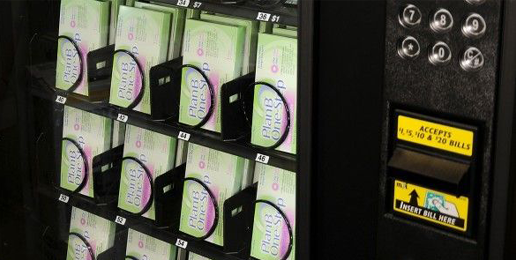
College can be one of the most exciting times in a young person’s life. They are leaving home, often for the first time, and venturing off to learn who they might become as adults. It is also a frightening time for both the students and their parents as these young adults test their independence. It is not uncommon to hear about students from loving Christian homes that find themselves in a predicament because they were unprepared to deal with the peer pressures of alcohol, drugs, or sex on the college campus. Despite these students’ stress, the Illinois General Assembly would like to make matters worse by mandating that all public college campuses offer emergency contraception in vending machines.
Sponsored by State Representative Barbara Hernandez (D-Aurora), HB 4247 requires all Illinois public colleges and universities to provide emergency contraceptives in an easily accessed vending machine. Each of the schools would have to provide at least one of the machines somewhere on their campus. Students would not be required to see a physician or obtain a prescription to use the vending machine drugs.
Emergency contraception, sometimes referred to as the morning-after pill, typically comes in two forms: Plan-B, also called Levonorgestrel, progesterone only pill, and EllaOne, which consists of Ulipristal Acetate. Both of these pills are supposed to inhibit ovulation preventing pregnancy. They work for up to 5 days following unprotected sex. However, conception may have already occurred because the medication is not taken until after sexual intercourse. In this case, these pills prevent a fertilized egg from implanting in the uterus, meaning the drugs become abortifacients.
The true nature of these pills often goes unadvertised. Many young women have no idea that the drugs may cause an early abortion. By having these pills in a vending machine, young women who might otherwise be pro-life could end up taking a medication that they might otherwise avoid. Not only that, but these vending machines would be readily available to anyone. There would be no need for an examination or a consultation with a physician. What would occur if a young woman had a condition that might be counter-indicated for her to take these pills? For example, there have been indications that Levonorgestrel can interact with some anticonvulsant medications given to people who experience seizures. A young woman on those anticonvulsants may have no idea that she could experience a drug interaction as a result of taking this vending machine pill.
Since a physician would not be involved in dispensing these powerful drugs, there would be no oversight and special instructions given to women as to what to expect. They might not know if they were experiencing an adverse reaction or what constitutes a medical emergency, which sometimes occurs with these medications. These young women might not have a physician they feel they can comfortably reach out to for help if they have questions. These vending machine pharmacies are removing healthcare from the hands of professionals and putting it into the hands of scared inexperienced young women.
The other problem with vending machines is that they can dispense to anyone and circumvents a physicians oversite. What about complications? Sexually transmitted disease? What about the emotional consequences of destroying your own child?
There are other concerns too: What about human traffickers that want to hide their crimes by eliminating pregnancies in their victims? Or what about the young boyfriend who decides to slip the drug to his girlfriend because he isn’t ready to be a father? What is preventing a high school student or even a middle school student from going to that campus to access the vending machine? There are too many possibilities of abuse with vending machine dispensaries, not to mention the atrocities of abortion that occur as a result, to allow such a horrific bill to be passed.
Take ACTION: Click HERE to contact your local state representative to let him/her know that you do not want your tax dollars used to subsidize emergency contraceptives on college campuses. Moreover, it is absolutely foolish to encourage risky sexual behavior in young people.
This bill passed out of the House Higher Education Committee. on February 9, 2022 by a vote of 6 to 4 and is on second reading. If you agree with us that that HB 4247 is dangerous and threatens the well-being of our young people, please contact your state representative.

























